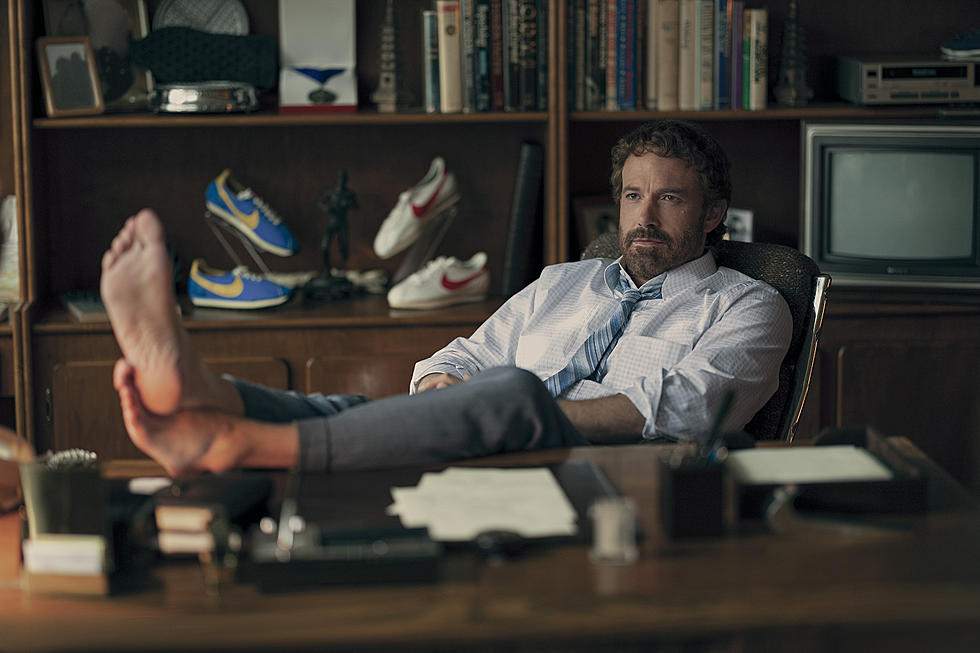
‘Air’ Review: A Biopic With Real Sole
One specific moment in Ben Affleck’s Air won me over for good. A down-on-his-luck Nike recruiter named Sonny Vaccaro has bet his career, and the careers of many of his colleagues, on the longest of long shots: That he can sign the #3 pick in the 1984 NBA Draft, Michael Jordan, to an endorsement deal. At the time, Nike is a distant third in the basketball sneaker market behind Adidas and Converse; with limited resources and a weak brand, Nike can barely compete with their larger rivals. Nike’s chances of landing Jordan are so slim that the Chicago Bulls guard’s agent, David Falk, refuses to bring Jordan to Nike headquarters in Portland for an introductory meeting.
So Vaccaro goes to the Jordans’ home in North Carolina instead. This is a major no-no; protocol dictates Vaccaro deal with Falk, and never contact Jordan’s family directly. Vaccaro’s rental car has an early cellular phone (remember, it’s 1984), and he uses it to call one of Nike’s marketing executives, Rob Strasser, who scolds Vaccaro about going around Falk, someone who will hold a grudge. Vaccaro agrees, but he is desperate.
Then Vaccaro hangs up the phone. For all narrative intents and purposes, the scene is over at that point. But Affleck keeps rolling, as Vaccaro continues driving down this road in North Carolina. He approaches a slow car and accelerates around it — even though to do so he needs to cross a double yellow line around a blind curve.
And that, in a classic show-don’t-tell moment, is who Sonny Vaccaro is. He knows the rules, and he’s not afraid to break them to get where he wants to go. This little detail also reveals, despite his frequent arguments with his co-workers, that Vaccaro is an ideal Nike employee, one who lives his life according to the third principle listed on the wall of Nike CEO Phil Knight’s office: “Perfect results count — not a perfect process. Break the rules: fight the law.”
Air may not be perfect, but it is full of touches like that. Vaccaro’s slightly reckless driving underscores Affleck’s thoughtful approach to the material. In another director’s hands Air could very easily have become a piece of corporate propaganda for Nike and its ongoing Michael Jordan apparel empire. And, in a way, it still is — only it’s now an exceedingly entertaining and impressively heart-warming piece of corporate propaganda.
Michael Jordan himself never appears onscreen, at least not in a speaking role; in the few moments where Jordan does show up, he’s played by a body double, and always seen from the back or obscured by other characters like his wise but extremely tough mother, Deloris (Viola Davis). The main character is Vaccaro (Matt Damon), who becomes convinced that the young Jordan is the man to build the entire Nike basketball division around.
Convincing others to buy into that vision is the tricky part. Vaccaro’s immediate boss, Howard White (Chris Tucker), likes the idea, but doesn’t think Nike can sign Jordan (and not unreasonably; if they could sign Jordan easily, this movie would not exist). Strasser, Nike’s key basketball marketing executive (played by Jason Bateman), thinks it’s way too risky to spend his entire endorsement budget on a single player. Jordan’s agent, David Falk (Chris Messina) hates the idea, because he knows Nike is a small-time player in the basketball world and he wants nothing but the best and most lucrative for his client. And Nike’s eccentric chief executive Phil Knight (Affleck), is increasingly worried about his stagnant business. He fears that spending hundreds of thousands of dollars on Jordan could only escalate a financial crisis within the company.
There is a line, first spoken by Bateman’s character, that becomes something of a mantra in Air: “A shoe is just a shoe until someone steps into it.” The same can basically be said of movies: No matter how interesting the concept, a film needs directors, writers, craftsmen, and actors all working together at the top of their talents to bring that concept to life. In the case of Air, we’re talking about a concept that is intensely uncinematic, especially since Jordan himself is not really an onscreen character. This is a story about schlubby, middle-aged dudes in polo shirts and jogging suits talking on the phone about contracts and sneaker specifications.
So credit firstly to screenwriter Alex Convery, for writing a script that constantly delivers snappy dialogue and tense scenes, even within those superficially bland trappings. And kudos to Affleck for assembling a terrific cast of actors, who enhance Convery’s work with lively performances. Although the ensemble is uniformly excellent, the clear standout is Messina, who manages to make David Falk both unwaveringly abrasive and strangely endearing all at once. It’s not hard to envision his performance becoming the focus of an awards campaign at the end of the year; he’s that good.
Air arrives in theaters on the crest of a wave of these kinds of brand origin stories; Tetris debuted on Apple TV+ recently, BlackBerry just premiered at the Berlin Film Festival, and Flamin’ Hot, about the birth of the spicy Cheetos flavor, will be streaming in June on Disney+ and Hulu. It is interesting to ponder why this is suddenly a full-blown movie trend. These types of business success stories do seem to give artists a little room to make movies with lots of dialogue and few special effects, about subjects other than superheroes and video games; movies that until very recently looked like an endangered cinematic species.
These brand stories also tap into some of the same nostalgia for ’80s and ’90s culture as those bigger blockbusters, only they do it in a less ostentatious — and, especially in the case of Air, more intelligent — ways. Michael Jordan may have been an exciting player on the basketball court, but Air itself is about as flashy as a well-worn pair of penny loafers, or a beat-up rental car cruising along a North Carolina highway.
RATING: 8/10

10 Movie Titles That Became Common Phrases
More From 104-5 KDAT










